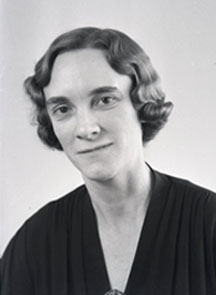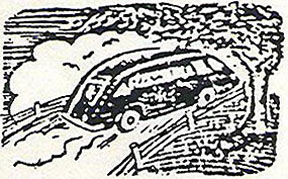|
Gretchen Knief, principled librarian
It wasn’t just a matter of a few dirty words. When the Kern County Board of Supervisors would not allow its county librarian to put The Grapes of Wrath onto the shelves of her library, Gretchen Knief circulated her 50 copies through libraries in counties where the ban did not apply. “Banning books is so utterly hopeless and futile,” she wrote to her county government bosses.

Gretchen Knief
A photograph from her time as country librarian, ca. 1938.
Kern County Museum (with permission)
“She was a tall woman, impeccably dressed, her smile warm. No one would have called the thirty-seven-year-old a beauty, and she could be a little awkward at times. But it was an endearing awkwardness, and everybody admired her smarts.”
— Rick Wartzman, Obscene in the Extreme (The Perseus Books Group, 2007).
From California Stories (California Council for the Humanities):
Here in California, the most contentious battle against Grapes of Wrath took place in Kern County, the heart of the state’s agricultural community. In a letter dated August 29, 1939, Kern County librarian Gretchen Knief describes in detail how she had returned from vacation the week before to find that the Board of Supervisors had unilaterally passed a resolution banning circulation of the library’s some 50 copies of The Grapes of Wrath. Although the Board’s case focused on Steinbeck’s use of objectionable language, much larger political issues were apparently at play. As Wilson Library Bulletin editor Stanley Kunitz later posited, among those who claimed the novel was “obscene [and] too filthy to handle” were “California’s fruit interests whom the book exposes, though nobody ever knew them to get excited before over a few dirty words.” ... Despite protests by both the public and library staff, the ban continued for a year and a half. Ever resilient, Gretchen Knief made the best of an unpleasant situation. Not one to waste perfectly good library resources, she offered Kern County’s copies of The Grapes of Wrath to colleagues throughout California. Within three months, the banned copies were temporarily redistributed to libraries in 19 counties. In January 1941, the Board’s resolution was finally rescinded and “full confidence in our county librarian” restored. According to one local newspaper, staff promptly reshelved the books, which had by then been returned to Kern County after serving readers around the state. A year later, a vindicated Gretchen Knief left California to become Washington State Librarian.
From an NPR interview with Rick Wartzman, author of Obscene in the Extreme
One powerful local player who pushed for the ban was Bill Camp, head of the local Associated Farmers, a group of big landowners who were avid opponents of organized labor. Camp and his colleagues knew how to get a bill passed in the state Legislature — and they also knew how to be physical. “They knew how to work with tire irons, pick handles and bricks,” says Wartzman. “Things could get really ugly and violent.”
Camp wanted to publicize the county’s opposition to The Grapes Of Wrath. Convinced that many migrants were also offended by their depiction in the novel, he recruited one of his workers, Clell Pruett, to burn the book.
Pruett had never read the novel, but he had heard a radio program about it that made him angry, and so he readily agreed to take part in what Wartzman describes as a “photo op.” The photo shows Camp and another leader of the Associated Farmers standing by as Pruett holds the book above a trash can and sets it on fire.
Meanwhile, local librarian Gretchen Knief was working quietly to get the ban overturned. At the risk of losing her job, she stood up to the county supervisors and wrote a letter asking them to reverse their decision.
“It’s such a vicious and dangerous thing to begin,” she wrote. “Besides, banning books is so utterly hopeless and futile. Ideas don’t die because a book is forbidden reading.”
Knief’s argument may have been eloquent, but it didn’t work. The supervisors upheld the ban, and it remained in effect for a year and a half.
Obituary from The Bookmark, Summer 1989
Gretchen Knief Schenk, an internationally recognized consultant on library extension services, died May 15, 1989. Mrs. Schenk, who was 87, lived in Summerdale, Alabama. Her chief connection with libraries in New York State was as a member of a team engaged by the State Education Department Division of Research that produced a 1949 report, Development of Library Services in New York State. In addition, her publications and a column in the Wilson Library Bulletin influenced librarians in New York and the nation at a time when the New York public library systems program and the Library Services Act had profound impact upon public libraries in rural areas.

Mrs. Schenk was a native of Milwaukee. She earned her bachelor’s degree at the University of California at Los Angeles and graduated from the University of Illinois Library School in 1930. Early in her career she held a number of professional positions in Wisconsin and California. While she was director of the Kern County Public Library in Bakersfield, Calif. (from 1937—42), The Grapes of Wrath was published and the library felt the wrath of local officials. She went to become State Librarian of Washington State, 1942—45. She began her consultant work after her marriage and move to Alabama, and she was engaged in the New York Study from 1947—49. In addition to her work in New York she directed library surveys in Mississippi, Missouri, Nevada, Illinois, Arkansas and Texas.
Schenk was a persuasive advocate of bookmobile service and was the author of County and Regional Library Development, published by the American Library Association in 1954. From 1946 through October 1967 she wrote a column on library extension in the Wilson Library Bulletin. The bookmobile drawing that appeared with her first column in September 1946 appears on this page.
The New York study of which Mrs. Schenk was a part was asked to determine “the extent to which public libraries are meeting the needs of the people of New York and then to make suggestions for improving and extending library service to fulfill these needs.” The study, which extended over a period of years, was closely related to developments at the time, including those in 1948 in which the Regents, the Governor and the Legislature agreed upon an experimental program of regional library service. This experiment was the Watertown Regional Library Center, the precursor of today’s cooperative public library systems.
| 
